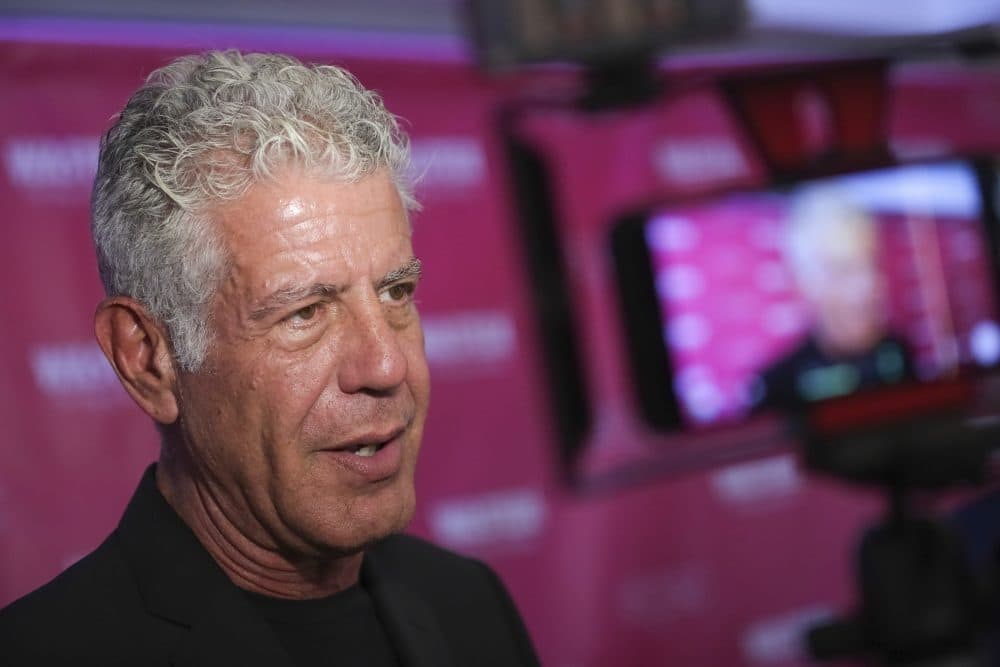Advertisement
Anthony Bourdain Wants You To Stop Wasting So Much Food
Resume
One-third of all the food produced each year for human consumption is never eaten. That unappetizing fact is the inspiration for a new documentary out Friday called "Wasted! The Story of Food Waste."
Here & Now's Jeremy Hobson talks with chef, author and CNN host Anthony Bourdain (@Bourdain) about the film.
Interview Highlights
On getting involved with the documentary
"I don't like the idea of being an advocate. I don't like to be certain of anything, or present myself as certain of anything, or adhering to any orthodox view on anything. I'm a doubter by nature. But this is an area, this is an issue, that goes fundamentally against my instincts as a longtime working cook and chef, where we were taught from the very beginning that one just does not and cannot and must not waste food."
On what people can do to limit food waste
"It begins in a sense with, how do we value the things we eat? It begins with just starting to pay attention to how much food you're buying, how much you are actually using, what you are doing with it. Simply by thinking about your home cooking in a way that professional chefs think about restaurant food, meaning, when you order food for the evening — because profit margins are so narrow in the restaurant business — the chef has always had to think, 'What happens if I don't sell all the chicken? What will I do with the leftovers? How will I make something delicious that I can sell that people will want and desire the next day?' If you think about food when you shop in that way, if you think also about all of the parts of proteins and vegetables that we don't currently use, that are in fact quite delicious — in many cases more delicious than the things we attach artificial value to — that's a start.
"And then demand more of our retailers. It is shocking that we expect of our chain supermarkets that they have towers of perfect-looking, highly perishable produce there. They put a lot of that produce on the shelf deliberately to look abundant, and for no other reason. They know that in order to maintain this look of abundance, this appearance of endless abundance, that they're gonna have to throw out a significant portion of that. We don't need that, we shouldn't want it and we shouldn't tolerate it."
"It begins in a sense with, how do we value the things we eat? It begins with just starting to pay attention to how much food you're buying, how much you are actually using, what you are doing with it."
Anthony Bourdain
On eating different parts of animals
"Foods that we never valued even 20 years ago are now the dishes of the moment. I mean, I remember when I started cooking in the early '70s, bluefin tuna would be sold for cat food. Octopus was a garbage fish, a trash fish ... beef cheeks, pork belly. These are hot menu items now. In many cases, in order to eat the food, the ingredients and the traditional dishes that the poor used to have to eat in this country, you have to go to a hipster restaurant in Brooklyn and pay $32 for a plate. So this is not that much of a stretch. It's really a matter of marketing and inspiring people, and in a lot of ways, it's up to chefs and food leaders to convince people with a beautiful and delicious argument that this is what food can be."
On the value of kids understanding where food comes from
"I have noticed in my travels, I think anyone who works in a farming community, anyone who lives close to or is involved in the production of food — whether they're fishing, farming, raising beef, whatever — they're less likely to waste, because they've seen it up close, how much work goes into it, what's involved. So I think even limited experience as a child seeing where food comes from and what's involved, this is surely a good thing."
This article was originally published on October 10, 2017.
This segment aired on October 10, 2017.
